“The future of love is bound to the institutions that have historically shaped and defined it,” Ipsos’s What the Future: Love report begins. Consider: religion, government, financial institutions….and the health care ecosystem, as well. On this Valentine’s Day 14th February 2023, it is a good time to consider this convergence as health politics, financial well-being, and emerging technologies will be re-shaping institutions and consumers in the coming months and near-term.
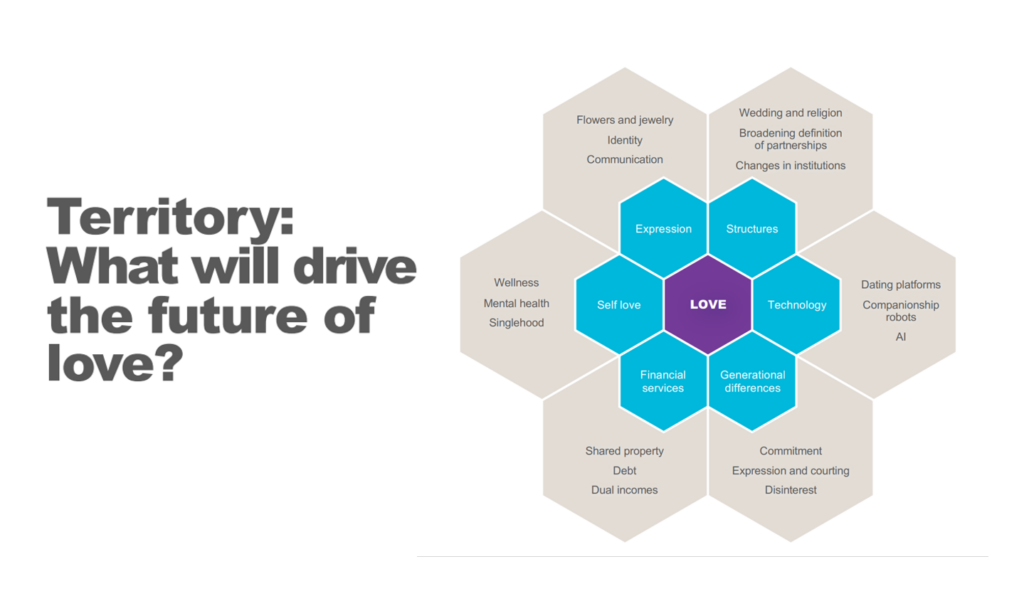
The Ipsos researchers have been assessing the future of many aspects of our lives over the past couple of years, such as the future of wellness, aging and health along with the future of work and play, spending and wealth, eating and beauty, among other facets of human life.
Ipsos’s territory diagram arrays the driving forces influencing the future of love — with health across many dimensions influencing our love-futures. Technology, in particular, will be playing a growing role in helping us find love, nurture love, and give love back to our community (looking well beyond Tinder toward the role of AI and other emerging tech’s).
Beyond some obvious things, in looking at love, Ipsos makes the connections between the emotion and its impacts on finances, housing, shopping/retail, and of course health and well-being.
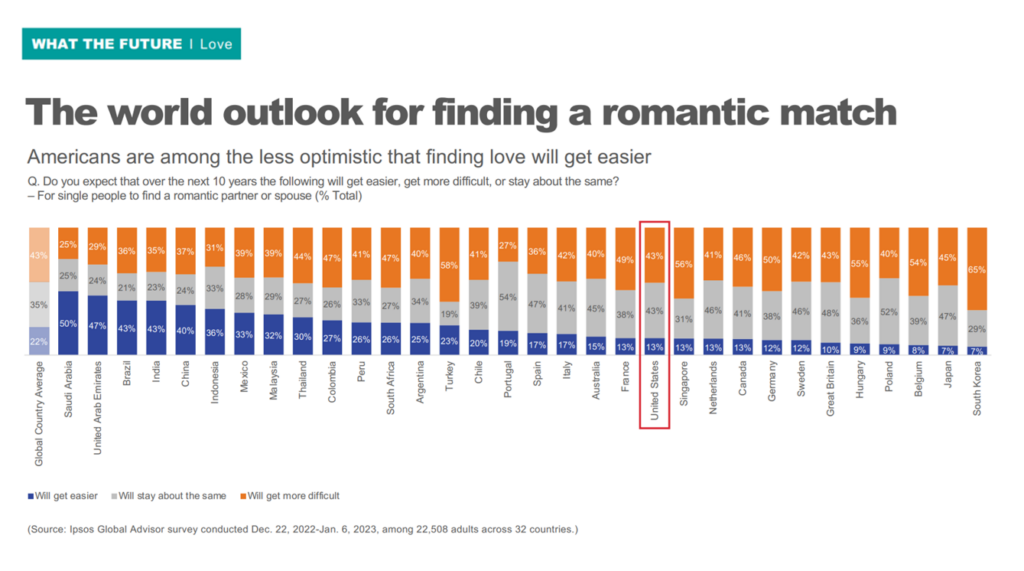
While the Ipsos report features mostly U.S. consumer data, the company’s Global Advisor survey conducted between December 2022 and January 2023 illustrates how people across the world are looking at love and romance.
Overall, 22% of people globally said finding love will get easier, 35% thought finding love would stay the same, and 43% around the world thought finding a romantic match will be more difficult.
For those in the U.S., the same percentage of folks — 43% — believe finding love will get tougher or stay the same. Only 13% of U.S. consumers think finding a romantic match will get easier.
“For romantics around the world,” Ipsos concludes, “things are looking more hopeless than hopeful.”
Consider declining trust in institutions, which I’ve gone on about more than you might have wanted to hear in this Health Populi blog. Notably, the Edelman Trust Barometer has been tracking trust-erosion among the world’s citizens for the past several years, most recently here in the 2023 study.
But trust is a precursor requirement to health engagement and engaging in the civic commons. And Ipsos’s Future of Love research also calls out the two institutions that have defined relationships — religions and governments — and peoples’ eroding faith in both.
At the same time, global citizens are tending to lean into greater flexibility in relationships across different dimensions.
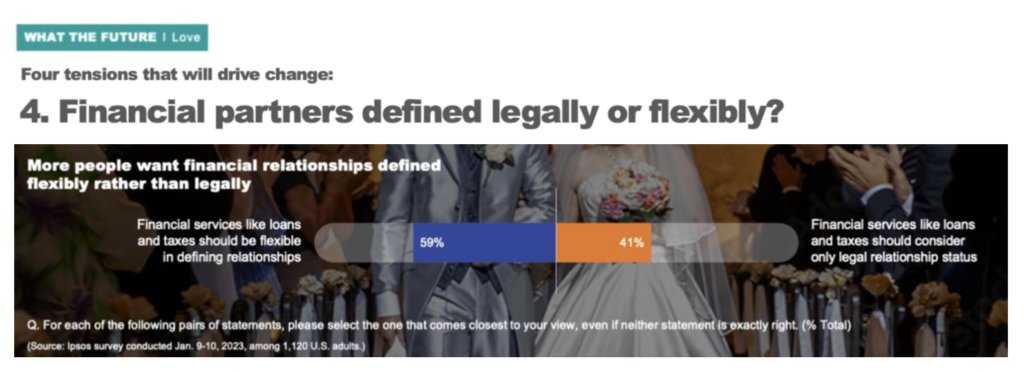
Take “Financial institutions [who] are forced to adapt,” the Ipsos futures team asserts in their analysis of the driving forces vis-à-vis consumer preferences.
Relationships are shifting, but institutions have been slow to adapt — yes, financial organizations, and yes, health care institutions, as well.
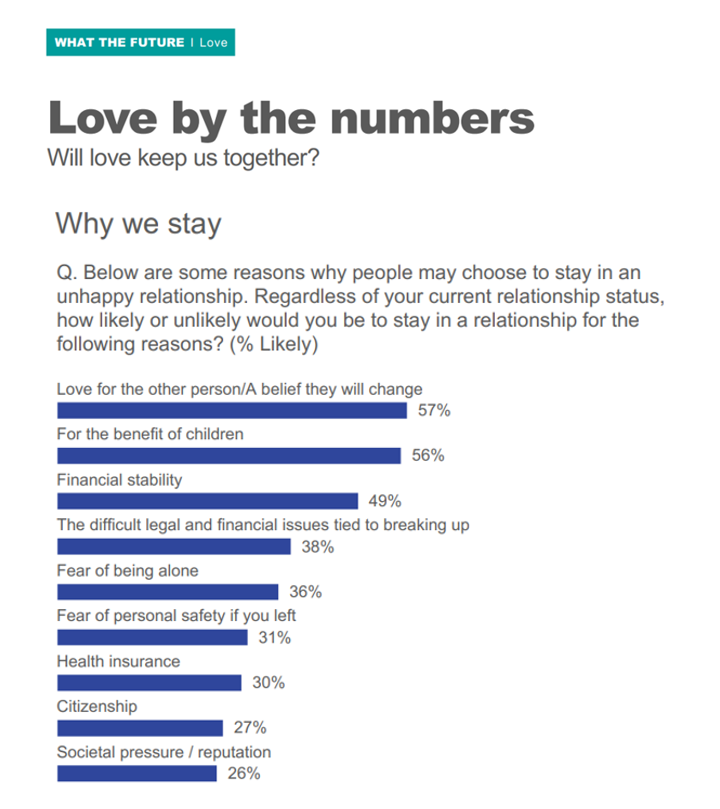
Health Populi’s Hot Points: Ipsos looked at what factors are splitting couples up, and why people are staying together. It’s Valentine’s Day and I’m one of those romantics Ipsos talks about….so let’s check into “why we stay” with our half-full drinking glasses.
It’s love and belief in our mates along with staying together for the benefit of our kids for over one-half of those likely to stay in their relationships.
The second major factor is financial stability, for one-in-two people wishing to stay in their relationship.
Then come legal and financial issues that make it tough to break up as well as the fear of being alone.
And 30% stay for the health insurance.
The Ipsos study raises that “Philosopher of Love, Huey Lewis’s” refrain that the power of love is, indeed, a curious thing.
The power of love in its best expression and incarnation is among the most powerful drivers of health and well-being. To bolster health citizens’ ability to flourish and be well, our institutions must develop policies and procedures that support people to be their best loving selves if we are to address the Deaths of Despair, growing social distancing, and increasing threats to our social fabric and communities.
It’s the right time to bake love and generosity of spirit into health insurance plans, health care delivery settings, clinical trials protocols, data hygiene and security, and advertising and branding across the health/care ecosystem.
As the lyrics of “The Power of Love” attest,
You don’t need money, don’t take fameDon’t need no credit card to ride this trainIt’s strong and it’s sudden and it’s cruel sometimesBut it might just save your lifeThat’s the power of love.
And as my Valentine’s Day gift to you, straight from The Huey Lewis Official Page, here is the complete “The Power of Love” video with Back to the Future goodness…


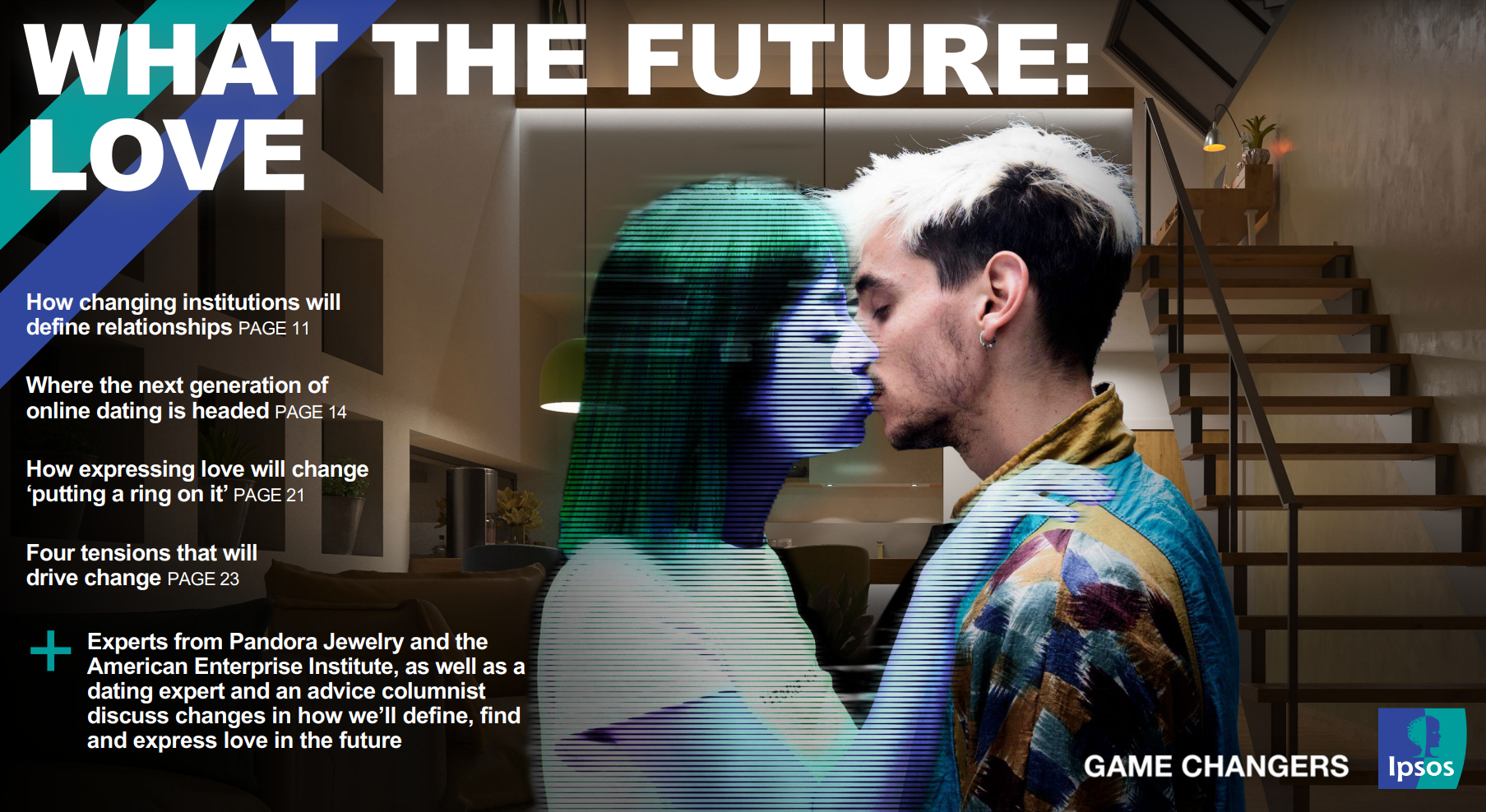


 Interviewed live on BNN Bloomberg (Canada) on the market for GLP-1 drugs for weight loss and their impact on both the health care system and consumer goods and services -- notably, food, nutrition, retail health, gyms, and other sectors.
Interviewed live on BNN Bloomberg (Canada) on the market for GLP-1 drugs for weight loss and their impact on both the health care system and consumer goods and services -- notably, food, nutrition, retail health, gyms, and other sectors. Thank you, Feedspot, for
Thank you, Feedspot, for  As you may know, I have been splitting work- and living-time between the U.S. and the E.U., most recently living in and working from Brussels. In the month of September 2024, I'll be splitting time between London and other parts of the U.K., and Italy where I'll be working with clients on consumer health, self-care and home care focused on food-as-medicine, digital health, business and scenario planning for the future...
As you may know, I have been splitting work- and living-time between the U.S. and the E.U., most recently living in and working from Brussels. In the month of September 2024, I'll be splitting time between London and other parts of the U.K., and Italy where I'll be working with clients on consumer health, self-care and home care focused on food-as-medicine, digital health, business and scenario planning for the future...